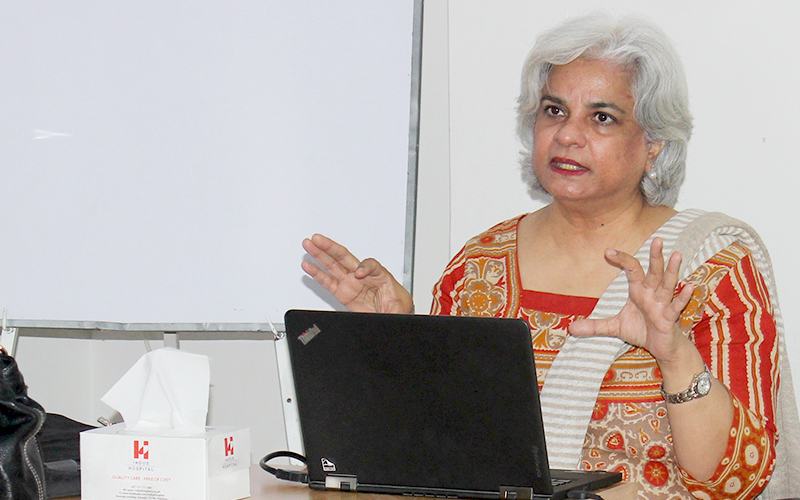TRAINING SESSION FOR CERVICAL CANCER SCREENING WITH DR. SADIAH AHSAN PAL
In recent years, cervical cancer prevalence has escalated in Pakistan such that approximately 20 women lose their battle daily, putting it amongst the top 10 countries with the highest female mortality rates. Although it is a preventable disease and most developed countries are on route to cervical cancer eradication, 80% of this deadly disease now exists only in developing countries like Pakistan where it is the third most common cancer of females, preceded only by breast cancer and some oral cancers. Unsurprisingly, these statistics — although staggering — are often viewed as just a number. It is, however, important to remember that these women are real people who could have been treated had there been organized and effective screening and preventive strategies.
Due to this escalated situation that we are now faced with regarding cervical cancer, The Indus Hospital organized a training session for cervical cancer screening on January 29, 2021 using Visual Inspection with Acetic Acid (VIA), led by Dr. Sadiah Ahsan Pal. January being Cervical Cancer Awareness Month added to the significance of this. This training was attended by roughly twelve physicians from various clinical services including, obstetrics & gynecology, family medicine & community health, as well as public health. The main purpose of this was to increase awareness of the dangers of cervical cancer, its’ risk factors, preventive strategies, and sustainable screening methods. Those who attended the training by Dr. Sadiah would then be able to train nurses, midwives, and other healthcare professionals in this fight against cervical cancer, as well as a mandate for increased attention toward the elimination of this disease which is a grave public health problem.
Currently in developing countries, there is a culture of opportunistic screening. That is, women who are at a lower risk of having cervical cancer are being screened, and high-risk women are not, thus masking its’ true incidence. Some high-risk factors being; number of sexual partners, lack of family planning, and smoking. The detection of cervical cancer in its initial stages can significantly decrease mortality rates and the Indus Hospital and Health Network (IHHN) is determined to initiate this process to reduce and eventually, eradicate this disease. There are various screening and preventive measures available globally, including the HPV vaccine, pap smears, and VIA. While the HPV vaccine is not readily available in Pakistan, regular pap smears and VIA are recommended. VIA is a simple, accurate inexpensive, and acceptable screening tool, and with adequate training, can be disseminated in community clinics, which is a goal that the IHHN has taken on, with this training session being a preliminary step toward it. In line with the World Health Organization’s elimination goals for cervical cancer, the hope is that with regular screening and treatment of any pre-cancerous cells, invasive cervical cancer, and its’ traumatic treatment can be avoided as much as possible. At the moment, physicians at The Indus Hospital are working tirelessly to train all relevant staff to carry out VIA screens and its ongoing quality control so that SSMC and public health initiatives can regularly offer these to at-risk patients.
“It is so essential that women start getting regular pap smears, usually recommended every 3-5 years, because until cervical cancer starts spreading, there are no symptoms so it will go undetected which can really be very dangerous.”




